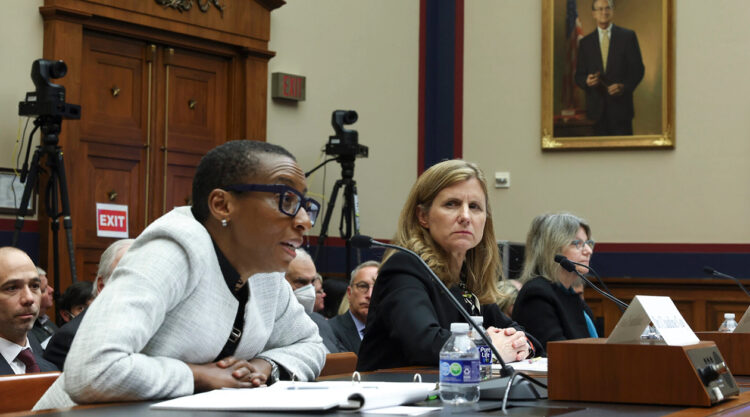The fight about how to deal with antisemitism: an unsatisfying debate

Opinion
By Martin Gottlieb
I wish I could believe that the huge, angry reaction against the congressional testimony by the presidents of three elite universities will do something about the rising tide of antisemitism, but I don’t.
The reaction seems to me a pathetic search for easy scapegoats. We can’t do anything about the marchers, the haters, the single-minded polarizing war policy of Israel or the preexisting problems of the Mideast or about the vast, legitimate, passionate differences of opinion about Mideast issues. But we can fire American college presidents. Great.
The immediate offense of the presidents – waffling on questions about whether they can legitimately repress calls for genocide against Jews – is understandable.
For some years now, universities have come under intense criticism for failing to protect freedom of speech. That criticism has come mainly from the political right, which sees itself as the main victim.
But others have seen merit in the complaints, which have been taken seriously not only at elite schools, but others. And they should be.
But now the presidents have to shift their defense, from rebutting the charge that they are too repressive to rebutting the charge that they are too permissive. Like a boxer might who suddenly finds an opponent shifting from right-handed to left-handed, they have had difficulty adjusting.
The questions from Rep. Elise Stefanik (R-N.Y.) were fair enough, given the rules of politics. But calls for genocide were not precisely the problem that the presidents had been focused on. They’ve been confronted with calls for intifada and for rejection of Zionism and with chants like “from the river to the sea” and “free Palestine.”
Although many people see genocidal impulses at work in those calls, the presidents would be hard-pressed to ban them. At the hearing, the presidents were reluctant to start down the slippery slope of speech repression, aware of political pitfalls there, too.
They didn’t handle the questions well. But the fact that all three stumbled in similar ways ought to tell us something about the difficult spot they were in.
At any rate, they are clearly not antisemitic. Some people do seem to believe that the presidents are insufficiently focused on the concerns of Jews, as opposed to other minorities.
The charge has been made that their answers would have been different if the minority in question had been Black people, rather than Jews. That seems like something to talk to them about, rather than fire them over, given that they are people of good will.
Or is the main charge simply that they are excessively rigid in defense of free speech? If so, they are caught in a whipsaw, given recent history.
What the presidents got caught up in is a fight about how to deal with antisemitism. This is an inherently unsatisfying debate. If there were an effective way to dispose of antisemitism, it would have been found by now. Ignoring antisemitism is as unsatisfying and dangerous as ignoring any festering problem.
But repressing it runs the risk of making it more attractive to some because it is forbidden, while running the additional risk of changing the debate into one about free speech.
An attempt to find a middle ground between those two options fosters endless debate about exactly where it should be, while offering little hope of success because you’re watering down two inherently flawed approaches. It’s tinkering.
In fact, the debate itself can become harmful if it simply divides the good guys, if it results in some opponents of antisemitism trashing other opponents of it. That’s the wrong fight.
In 2009, some Israeli film makers came out with Defamation, a documentary arguing that antisemitism was largely dead, and that Jews ought to stop worrying about it. The film targeted the Anti-Defamation League for its obsession with an allegedly solved problem. Many American Jews – hardly victimized by antisemitism, if at all – would have seen some merit in the movie’s argument.
But now here we are – long after that movie and a century after the birth of the ADL – and antisemitism is worse than ever in the lives of millions now alive.
Clearly, in the rise and fall of antisemitism, forces are at work that are bigger than can be accounted for by any analysis of who’s doing what to combat it. Fighting over which well-intentioned people should be running universities might make us feel like we’re doing something useful. But it’s only a feeling.
Retired Dayton Daily News editorial writer Martin Gottlieb is the advisor to The Dayton Jewish Observer.
To read the complete January 2024 Dayton Jewish Observer, click here.





